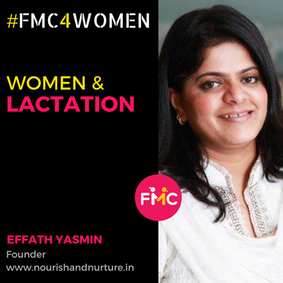 1. While you wait for your baby during pregnancy, build your ‘Tribe’ and after birth find your ‘Tribe’. A tribe of people amongst your care givers, family, friends and the online support groups who acknowledge and support your choice to breastfeed your baby are essential for your journey as a breastfeeding mother. 2. Plan and work towards a gentle and supported birth. Your experience of labor and birth can have a profound direct impact on the success of your breastfeeding. Choosing a midwife/birth doula and a healthcare provider who is supportive of your choice of gentle birth in an a birthing environment such as home or a hospital which is certified by UNICEF/WHO initiative Baby Friendly Hospital Initiative (BFHI) is an essential step towards avoiding most of the birth interventions —potential causes for breastfeeding problems including inability to latch, low milk supply, post-partum depression and sore nipples. 3. Never miss the Golden First Hour to feed your baby after birth. What’s crucial about the first hour of baby’s life at the breast is baby’s natural hard wired reflexes to latch and feed. Plenty of skin to skin close contact between you and your baby will allow for the body regulation of milk making and bonding hormones. Practice Kangaroo Mother Care (KMC) after birth until you leave the hospital even if you baby isn’t premature. You may well be bidding goodbye to the common experience of breast engorgement at all. KMC promotes natural cycles of feeding & sleeping. 4. Pain is never normal in breastfeeding. If you are experiencing pain seek professional help from your Board Certified Lactation Consultant (IBCLC). Breastfeeding should be enjoyable and pain is a sign of communication that something not going on. 5. Follow your instincts when you feel in your gut that something isn’t ok about breastfeeding your baby. Smooth Breastfeeding experience is an early health radar of a developing baby. 6. Often the milk supply issue isn’t the cause but just a symptom of the underlying factors that are not diagnosed well. If you are ever concerned consult your lactation consultant. 7. You will be thankful to know breastfeeding isn’t about being stuck at home only feeding but about experiencing the joy of being liberated from carrying loads of feeding supplies and finding your life with your baby. 8. Make the most of maternity leave if you are a working mother. Establishing a good rhythm of early weeks of breastfeeding can go a long way to continued feeding even when you return back to work. Published in FMC (First Moms Club) as "Today we have FMC Mommy Effath Yasmin giving us some useful tips on Lactation. She is an International Board Certified Lactation Consultant, a Certified Lactation Educator, an accredited Le Leche League Leader and a Biodynamic Craniosacral practitioner. She is the Director of Nourish & Nurture an outreach for Clinical Lactation Care to pregnant and nursing mothers and craniosacral biodynamic treatment." https://www.facebook.com/firstmomsclub/posts/1310234649059299:0
2 Comments
 Over 98% of women who sought desperate support for trauma resolution and challenging breastfeeding issues in my private lactation clinic are often whose journey of labor & birth has been fraught with challenging birthing experience. This includes medical interventions, surgery, lack of birth support and separation from baby. Birth is an intense experience both for baby, mother and the family. Yet it is a normal physiological process. When it is colored with fear, anxiety, pain and suffering this experience then becomes traumatic and makes it an overwhelming experience. Human rights in childbirth would have never been a subject to discuss if we as a society had honored the self autonomy of women to birth on her inner wisdom. To investigate and address this very daunting trauma through one of the most intimate and visceral experiences of a woman’s life – Birth India, in collaboration with Human Rights in Childbirth, held a conference recently in Mumbai. The Human Rights in Childbirth India Conference was a part of a global discussion to address the provision of respectful, culturally sensitive, human rights based maternity care. Birth India’s cause remains close to my heart in many ways. Some of my own experiences of birthing my daughter in a rather comfortable and supportive environment even though it was a high risk surgical birth made me question the whole paradigm of what is supportive birth. Educating and supporting women around birth thereby became the single most mission of my life. Birth India perhaps was my first exposure to connecting with the social voices outside of my world and perhaps my little window to hear and see other women’s voices. Being on the Board involves one to hold the vision and even though, many a time, when the vision blurred it stayed clear with new voices coming just when the vision faded over the past decade. I tremendously celebrate the selfless dedicated work of these women who made the small team with large hearts who made it work. The fact is, breastfeeding often slips through the cracks created in the biome of mother and baby due to birth trauma. Not enough noise is made about this fact and must I say, not even enough amongst many birth workers themselves. Loss of early initiation of breastfeeding and then premature weaning of breastfeeding is the darkest reality of the impact of poor support in childbirth and rising number of C-section births. We may eventually be heading towards raising infant human rights to seed and feed if we continue to ignore the fundamental needs of a baby: #1: A chance for baby to trigger labour and birth #2: A chance to have an undisturbed skin to skin closeness with mom #3: A chance to not experience distress from separation from mom for routine procedures. #4: A chance to initiate breastfeeding right after birth #5 A chance to not experience birth trauma due to routine labor pain management and birth augmentation. #6: A chance to not taste infant formula unnecessarily. #7: A chance to experience joyful and comfortable breastfeeding. #8: A chance to optimal development and growth with direct breastfeeding. #9: A chance to normalise overall health, immunity and muscular-skeletal functions with direct breastfeeding. #10: A chance to life. Even though the Human Rights in Childbirth conference didn’t as much raise and debate the true impact of poor birth support resulting in horrific realities of distressed parents trying to feed their babies, the conference marvelously began the dialogue. It had to begin somewhere and the HRiC conference did just that. Frankly, I also think the debate about sub-standard care for breastfeeding mothers and the voices of struggling mothers who wish to breastfeed needs a whole platform or conference of its own! In order for that to happen first many need to understand the prerogative of women to birth respectfully which HRiC managed to create a noise about. What was thrilling for me to witness is how the glass of territories between the medical community, educators, policy makers and birth workers shattered during the conference. It was the birth of new direction of action. For the first time we heard Obstetrician/Gynaecology clinicians acknowledge the need to break away from deep seated mindset of “Good doctor, naive patient” model to “trusting doctor, empowered mother”. While it seems important that advocacy lobbyists engage and move the political will of the policy makers to listen up and include essential human rights of birthing women and secure legislation in public and private maternal health care system, it seems not so important in a democracy like India. The liberty to service is a fundamental right of every citizen anyways. Hospitals like Fernandez Hospital in Hyderabad, Sitaram Bhartia Institute of Science and Research in New Delhi and many other individual service providers including Lactation Consultants, Midwives, Doula, and Obstetricians have moved their personal will to better the system and services without a need to policy change. My summary of the take away from the conference that adds to my personal vision and commitment includes: #1 Push forward the agenda of respective care for bringing in Justice, Dignity and Respect in the medical maternal health system in India in policy changes as a fundamental right of a women. #2 Value the traditional birth companion model and integrate, create a system of holistic certified midwifery to counter the increasing maternal deaths & significantly reduce unnecessary c-sections in India. #3 Create mitigation and contingency plan for current poor scenario of abuse and trauma in childbirth until we build prevention systems by
This conference and the roll over effect of crack down on increase surgical births is a game changer in Indian scenario. I hope for a day when the message is assertive & clear through such selfless workers of birth that, just as, Birth is a primal instinct for a woman and is an experience beyond just survival, breastfeeding is a primal instinct for a baby and is certainly beyond just the survival and being just fed. Publshed in Birth India Website http://birthindia.org/2017/03/07/birthing-experience-and-breastfeeding-fundamental-human-rights/ |
Effath Yasmin"For hardship is an opportunity to learn and is a growth of your soul." Archives
March 2017
Categories
All
|
 RSS Feed
RSS Feed